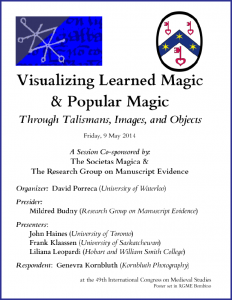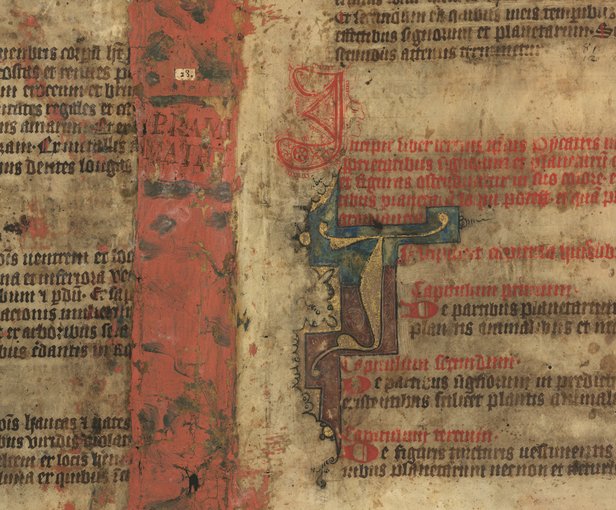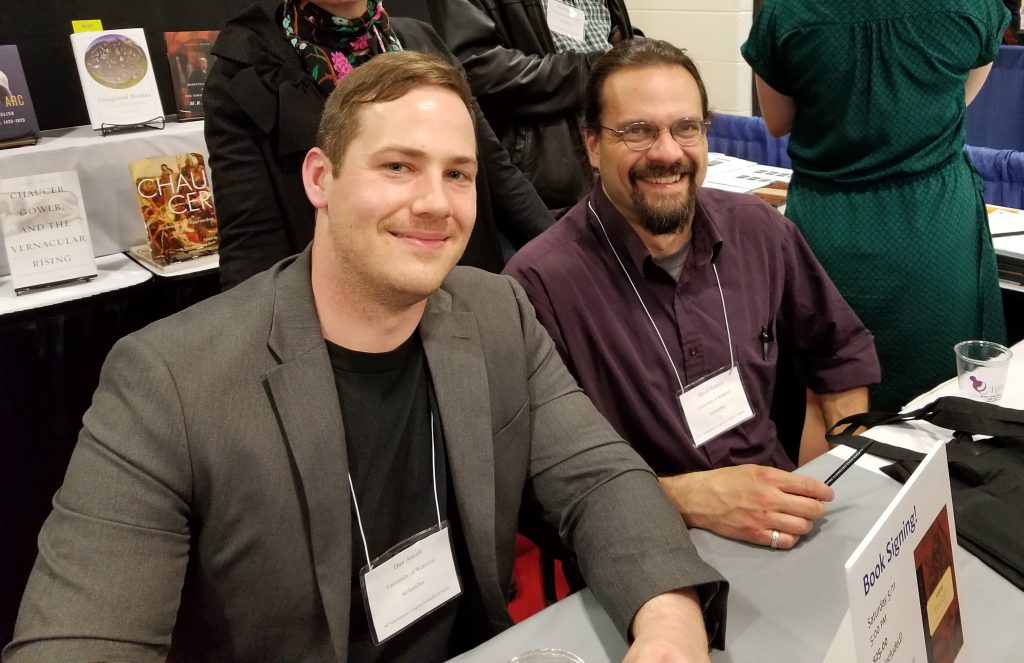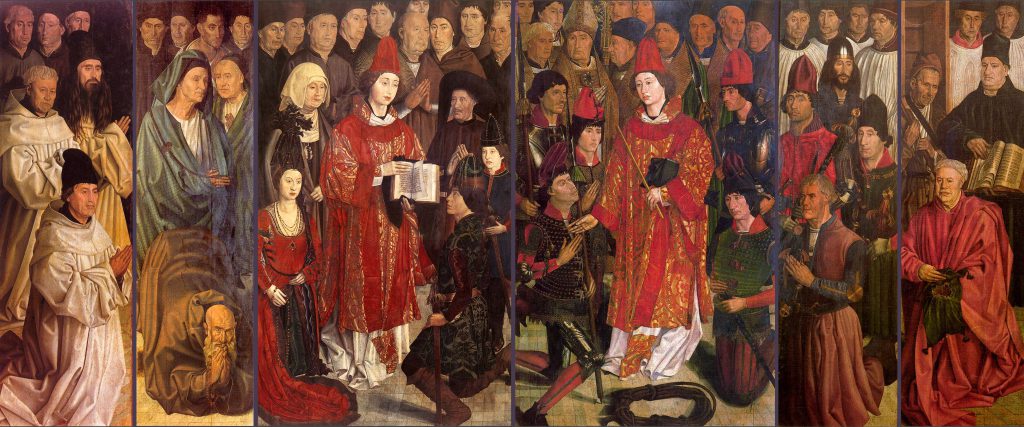Episode 14: “Translating the Latin Hermetica by Committee”
September 19, 2023 in Manuscript Studies, Uncategorized
The Research Group Speaks
Episode 14
Sunday 19 November 2023 online
1:00–2:30 pm EDT (GMT-5) by Zoom
“Translation by Committee:
The Latin Hermetica“
David Porreca, Dan Attrell, and Brett Bartlett
[Posted on 18 September 2023, with updates]
We invite you to attend Episode 14 in our series.
The Series:
The Eventbrite Portal for this Series:
Meet the Committee
This time, a team of scholars — including two of our RGME Associates — will speak about their current project of translating a complex occult text from Latin to English.
They are: The Teacher, his Former Student, and his Student.
- David Porreca
- Dan Attrell (see also Congratulations and Podcasts with Dan Attrell)
- Brett Bartlett (see also Brett Bartlett)
Over the years, David Porreca has organized or co-organized Sessions for the RGME and our frequent co-sponsor, the Societas Magica, at the annual International Congress on Medieval Studies. He has presented Papers for them or other Sessions which we have sponsored or co-sponsored. He has contributed regularly to our online Symposia and Episodes of “The Research Group Speaks”. A good number of his students and former students have contributed, and continue to contribute, to RGME activities, including our events and work behind the scenes enabling them.
 Some of his contributions:
Some of his contributions:
- Porreca (2023 Congress)
- Porreca (2022 Congress)
- Porreca (2021 Congress)
- Porreca (2020 Congress)
- Porreca (2018 Congress)
- 2023 International Congress on Medieval Studies Program
- 2022 International Congress on Medieval Studies Program
(Etc.)
David serves on the RGME Editorial Committee, where his experienced advice about texts and handling them effectively for publication comes in handy.
Dan Attrell also has presented reports on his work for the RGME.
Brett Bartlett, when we first met years ago in Kitchener, Ontario, demonstrated quick and erudite acumen when, almost at once, he pointed out a small mistake in the Old English portion of our then-new publication of Multi-Lingual Bembino; it was swiftly corrected in a next issue, which we, as the publisher, could make very soon.
In this context, we will be able to see that, when it comes to the demands of (and for) the translations, “Not Two but Three [Talking] Heads are Better Than One”.

Martin, Slovakia, Slovak National Library, Fragment of the Picatrix, circa 1400 CE. Image Public Domain via Wikimedia Commons.
Meet the Committee and Their Latin Translations into English
The collaborations have already yielded publications of scholarly translations of Latin texts into English.
- Picatrix: A Medieval Treatise on Astral Magic, translated with an Introduction by Dan Attrell and David Porreca. Magic in History (University Park, Pennslvania: Penn State University Press, 2019)
- On the Christian Religion, by Marsilio Ficino. Translated by Dan Attrell, Brett Bartlett and David Porreca, with Introduction and Notes by Dan Attrell, Brett Bartlett and David Porreca (Toronto: University of Toronto Press, 2022)
RGME Congress Sessions (co-sponsored with the Societas Magica) have had the opportunity to hear previews of the work, as Dan Attrell and David Porreca described aspects of their work on the Picatrix (in 2018) and David Porreca reported characteristics of Ficino’s text and his attitudes toward his printer in 2022. See, for example, Attrell (2018 Congress) and Porreca (2022 Congress).
With each of these books, the Research Group had the opportunity follow the course of the project, with papers presented for our Sessions co-sponsored with the Societas Magica at the International Congress on Medieval Studies at Kalamazoo. For the Picatrix, the first presentation considered the project in advancing stages; the second coincided with the book launch and book-signings.
Last year we heard from David about work on the text by the Italian humanist author Marsilio Ficino in one of our own sponsored Sessions. That book has appeared. Now we can look over the translators’ shoulders, as it were, and hear about the progress — and the process — of the next one.

The Book Signing at the 2019 Congress. The Translators Dan Attrell and David Porreca greet their fans. Photography Mildred Budny.
The Source Text: The Latin Hermetica

Corpus Hermeticum: first Latin edition, by Marsilio Ficino, 1471 CE, in a copy formerly at the Bibliotheca Philosophica Hermetica in Amsterdam. Image via Wikimedia Commons via Creative Commons.
Note on the image
The first Latin edition of the Corpus Hermeticum was prepared by Marsilio Ficino (1433–1499), who completed the first fourteen treatises; the full set of its eighteen treatises was completed by Ludovido Lazzarelli (1447–1500).
On this publication and a few known extant copies (not yet with accessible digitized facsimiles), see, for example, the Incunabula Short-Title Catalogue (ISTC), no. ih00083000:
- Hermes Trismegistus and Hermes Trismegistus.
Hermes Trismegistus: De potestate et sapientia Dei, translated by Marsilius Ficinus (Treatises I–XIV),
with the Crater Hermetis (Treatises XV–XVIII) translated by Ludovido Lazzarelli
(Venice: Petrus de Quarengis. Bergamo, about 1517)
The image shows a well-worn copy opened to the beginning of Ficino’s Argumentum.
The Plan
Our Speakers will tell us soon what they wish to address for our Episode. Watch this space.
In the form of Questions-and-Answers, the conversation may explore such puzzles as these.
1. What led you to choose this text to translate? And Why? For what audiences?
2. Why translate the text, anyway? That is, why provide this feature on top of, or alongside, a proper scholarly edition of the text in its original (or transmitted) language(s)?
3. What choices do you prefer to take to the skill/art of translation in general and in particular? Do you each agree about the choices, or, if not, how do you resolve the differences in order to progress with the work in a unified way?
4. Approaching the challenges of ‘faithful’ rendition in converting text from the source language to the target language, would you say that you would prefer an approach by “Rhyme or [else] Reason”?
Or, as King Alfred the Great (circa 849 – 899) put it memorably in describing one of his — collaborative — translations from Latin to Old English, “Sometimes word for word, sometimes sense for sense”. Can it be possible to have the best of both?
What is your take – and your collective take — on these issues for translation and translators?
5. What underpins your choice to translate ‘by committee’, that is, in collaboration?
6. How do you decide who should do which parts of the work, and divide up the tasks involved?
7. How does the collaboration work, exactly? How would you advise others to do it?
These questions and more can reveal the depth and breadth of responses which the collaborating translators approach the work — and ‘survive’ the process constructively in order to continue the work by turning to the next text. Which leads to the next question:
8. What comes next?
Perhaps you have other questions to bring to the table, as we provide it with Food for Thought.
We thank the translators for joining our Episode and sharing some tips, lessons, and recipes for their collaborative accomplishments.
Registration for the Episode
Episode 14 in the online series of “The Research Group Speaks” is planned for Sunday 19 November 2023, via Zoom, at 1:00 pm EST (GMT – 5) for about 1 1/2 hours, with discussion and Q&A. You are welcome to join us.
If you wish to attend, please register here:
Registration via the RGME Eventbrite Collection
Registration for this Episode: Sunday 19 November 2023 by Zoom
Registration is free.
We offer the option for Registration with a Donation, which we welcome. Donations, which may be tax-deductible, help us to continue with our activities and sustain our mission for an organization principally powered by volunteers.
After registration, the Zoom link will be sent a few days before the event.
If you have questions or issues with the registration process, please contact director@manuscriptevidence.org.
We thank you who have registered and given an optional Donation.
Future Episodes
Future Episodes are planned. See:
Episode 15 is scheduled for Saturday 19 January 2024 online via Zoom. Its subject is
- “Women Writers from the Medieval to Post-Modern Periods”.
Suggestion Box
Please leave your Comments or questions here, Contact Us, or visit
- our FaceBook Page
- our Twitter Feed (@rgme_mss)
- our Blog on Manuscript Studies and its Contents List
Donations and contributions, in funds or in kind, are welcome and easy to give. See Contributions and Donations.
We look forward to hearing from you.
 Lisbon
Lisbon
, Museu Nacional de Arte Antiga: The mid 15th-century Saint Vincent Panels, attributed to Nuno Gonçalves. Image (https://upload.wikimedia.org/wikipedia/commons/3/3a/Nuno_Gon%C3%A7alves._Paineis_de_S%C3%A3o_Vicente_de_Fora.jpg) via Creative Commons.
*****
